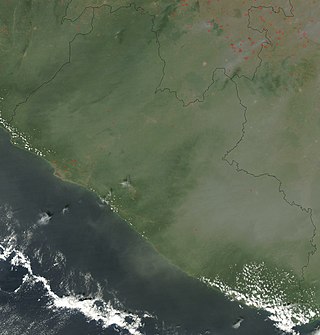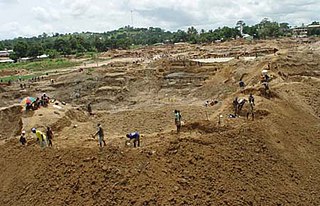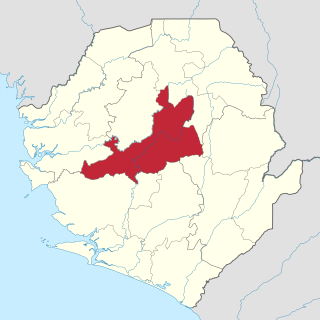Related Research Articles

Liberia is a sub-Saharan nation in West Africa located at 6 °N, 9 °W.

Mining is the extraction of valuable geological materials and minerals from the surface of the Earth. Mining is required to obtain most materials that cannot be grown through agricultural processes, or feasibly created artificially in a laboratory or factory. Ores recovered by mining include metals, coal, oil shale, gemstones, limestone, chalk, dimension stone, rock salt, potash, gravel, and clay. The ore must be a rock or mineral that contains valuable constituent, can be extracted or mined and sold for profit. Mining in a wider sense includes extraction of any non-renewable resource such as petroleum, natural gas, or even water.

The economy of Sierra Leone is $4.558 billion by gross domestic product as of 2024. Since the end of the Sierra Leone Civil War in 2002, the economy is gradually recovering with a gross domestic product growth rate between 4 and 7%. In 2008 it in PPP ranked between 147th by World Bank, and 153rd by CIA, largest in the world.
Pepel is a coastal town in the Port Loko District in the Northern Province of Sierra Leone.

The Eastern Province is one of the four provinces of Sierra Leone. It covers an area of 15,553 km2 and has a population of 1,641,012. Its capital and administrative centre is Kenema. Eastern Province, the centre of the country's diamond mining industry, is very mountainous and has two ranges, the Gola Hills and the Loma Mountains.

Tonkolili District is a district in the Northern Province of Sierra Leone. Its capital and largest city is Magburaka. The other major towns include Masingbi, Yele, Mile 91, Bumbuna, Yonibana, Matotoka. Mathora, Magbass and Masanga. Tonkolili District is home to the largest sugar factory in Sierra Leone, and one of the largest sugar factories in West Africa, that is located in the town of Magbass. Tonkolili District had a population of 530,776. The district occupies a total area of 7,003 km2 (2,704 sq mi) and comprises eleven chiefdoms.
Vasile Frank Timiș is a Romanian-Australian businessman living in London, with interests in mining and oil extraction industries. The Sunday Times Rich List estimated his wealth at £162m (US$238m) as of April 2008, making him the 497th richest person in Britain. The Romanian magazine Capital reckoned Timiș to be the 9th richest Romanian, estimating his wealth at $290m as of 2006. In 2012 he became the richest Romanian with a net worth of £1.34 billion (US$2.13 billion). A BBC News investigation alleged that Timiș paid £35.20 in tax in 2017 despite living a life of luxury, and included a statement from the Tax Justice Network suggesting that Timiș be investigated for tax fraud. In 2017, BP acquired Frank Timis's stake in a Senegal gas field for $250 million, with documents later revealing an additional $9–12 billion in royalties to be paid to Timis's company. Both parties deny wrongdoing, with Timis having an estimated net worth of $12 billion.

The Rokel River is the largest river in the Republic of Sierra Leone in West Africa. The river basin measures 10,622 km2 (4,101 sq mi) in size, with the drainage divided by the Gbengbe and Kabala hills and the Sula Mountains. The estuary which extends over an area of 2,950 km2 (1,140 sq mi) became a Ramsar wetland site of importance in 1999.

The Broken Hill Ore Deposit is located underneath Broken Hill in western New South Wales, Australia, and is the namesake for the town. It is arguably the world's richest and largest zinc-lead ore deposit.
Railway stations in Sierra Leone include:
The mineral industry of Russia is one of the world's leading mineral industries and accounts for a large percentage of the Commonwealth of Independent States' production of a range of mineral products, including metals, industrial minerals, and mineral fuels. In 2005, Russia ranked among the leading world producers or was a significant producer of a vast range of mineral commodities, including aluminum, arsenic, cement, copper, magnesium compounds and metals, nitrogen, palladium, silicon, nickel and vanadium.
Bumbuna is a town in the central of Tonkolili District in the Northern Province of Sierra Leone. The town lies about 30 miles from the district capital of Magburaka and approximately 124 miles northeast of Freetown.
The West African Craton (WAC) is one of the five cratons of the Precambrian basement rock of Africa that make up the African Plate, the others being the Kalahari craton, Congo craton, Saharan Metacraton and Tanzania Craton. Cratons themselves are tectonically inactive, but can occur near active margins, with the WAC extending across 14 countries in Western Africa, coming together in the late Precambrian and early Palaeozoic eras to form the African continent. It consists of two Archean centers juxtaposed against multiple Paleoproterozoic domains made of greenstone belts, sedimentary basins, regional granitoid-tonalite-trondhjemite-granodiorite (TTG) plutons, and large shear zones. The craton is overlain by Neoproterozoic and younger sedimentary basins. The boundaries of the WAC are predominantly defined by a combination of geophysics and surface geology, with additional constraints by the geochemistry of the region. At one time, volcanic action around the rim of the craton may have contributed to a major global warming event.

The mining industry of Sierra Leone accounted for 4.5 percent of the country's GDP in 2007 and minerals made up 79 percent of total export revenue with diamonds accounting for 46 percent of export revenue in 2008. The main minerals mined in Sierra Leone are diamonds, rutile, bauxite, gold, iron and limonite.
Koidu Limited a subsidiary of OCTÉA Limited, is a locally registered Company in the Republic of Sierra Leone.
This is a list of countries by titanium sponge production based on USGS figures. The production figures are for titanium sponge, units are in metric tons.

The mining industry of Liberia has witnessed a revival after the civil war which ended in 2003. Gold, diamonds, and iron ore form the core minerals of the mining sector with a new Mineral Development Policy and Mining Code being put in place to attract foreign investments. In 2013, the mineral sector accounted for 11% of GDP in the country and the World Bank projected a further increase in the sector by 2017.
The geology of Liberia is largely extremely ancient rock formed between 3.5 billion and 539 million years ago in the Archean and the Neoproterozoic, with some rocks from the past 145 million years near the coast. The country has rich iron resources as well as some diamonds, gold and other minerals in ancient sediment formations weathered to higher concentrations by tropical rainfall.
Sierra Rutile Limited is a mining company with headquarters based in Freetown, Sierra Leone. The company currently has operating mines for Rutile, ilmenite, zircon, and titanium dioxide minerals in South and Northwest Sierra Leone, specifically in the Moyamba and Bonthe Districts. Australian-based Iluka Resources Limited acquired the company in December 2016 and subsequently installed new and currently acting CEO Rob Hattingh.
Selection Trust was a British mining finance house. It was started in 1913 by A. Chester Beatty, a mining engineer from the United States. After the end of the First World War, Beatty built up a substantial portfolio of mining interests, many of them in Africa, but others in Serbia and in Siberia. Initially the company began operations by sharing an office at Number One London Wall in the City of London with the consulting firm of Herbert Hoover, a fellow American mining engineer.
References
- 1 2 "Iron: The Bagla Hill (sic) Deposit" (PDF). Directorate of Geological Survey Sierra Leone. June 2016. Archived from the original (PDF) on 2016-10-20. Retrieved 2016-10-20.
- 1 2 3 4 Mark Leftly (29 September 2012). "Diet tycoon tries to fatten Sierra Leone". The Independent .
- 1 2 "A Near Miss? Lessons Learnt From the Allocation of Mining Licences in the Gola Forest Reserve in Sierra Leone" (PDF). Global Witness. February 2010. pp. 2–3.
- ↑ "West Africa Mining". The International Resource Journal. July 2012. Archived from the original on 2016-10-20. Retrieved 2016-10-20.
- ↑ "Sable Mining Africa Limited – Bagla Hills scam". Sierra Express Media. 13 April 2011.
- ↑ Office of the Minister of Tourism and Cultural Affairs. "Gola Rainforest National Park". UNESCO.
- ↑ Fayia Amara Fayia (2 October 2016). "Iron Ore Lease Cancelled....Le 50M Cost Awarded". The Standard Press.
- ↑ "The Gola Red Project" (PDF). Royal Society for the Protection of Birds. p. 25.